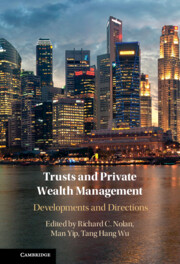Book contents
- Trusts and Private Wealth Management
- Trusts and Private Wealth Management
- Copyright page
- Contents
- Contributors
- Table of Cases
- Table of Legislation
- 1 Introduction
- 2 Family Trusts Today
- Part I The Rise of Asian Wealth
- 3 Asian Wealth in the United States
- 4 Regulation of Residential Property in the West
- 5 An Asian Approach to Mental Capacity for Wills and Lasting Powers
- 6 Testamentary Freedom and Inheritance Disputes in Hong Kong
- 7 Crazy Rich Families in Singapore
- 8 Family Offices, Private Trust Companies, and Trust Integrity Issues
- Part II The Changing Legal Context
- Index
6 - Testamentary Freedom and Inheritance Disputes in Hong Kong
from Part I - The Rise of Asian Wealth
Published online by Cambridge University Press: 08 December 2022
- Trusts and Private Wealth Management
- Trusts and Private Wealth Management
- Copyright page
- Contents
- Contributors
- Table of Cases
- Table of Legislation
- 1 Introduction
- 2 Family Trusts Today
- Part I The Rise of Asian Wealth
- 3 Asian Wealth in the United States
- 4 Regulation of Residential Property in the West
- 5 An Asian Approach to Mental Capacity for Wills and Lasting Powers
- 6 Testamentary Freedom and Inheritance Disputes in Hong Kong
- 7 Crazy Rich Families in Singapore
- 8 Family Offices, Private Trust Companies, and Trust Integrity Issues
- Part II The Changing Legal Context
- Index
Summary
In Ilott v. The Blue Cross, the UK Supreme Court restated the centrality of the principle of testamentary freedom in English succession law. This chapter considers the principle’s application in the context of will and trust disputes in Hong Kong, an English common law jurisdiction that is not only influenced by Chinese culture and traditions but also serves as a hub for mainland Chinese entrepreneurs who may be subject to the forced heirship laws of civilian China. The chapter has two objectives. First, it reviews recent notable family inheritance cases pertaining to the application of the testamentary freedom principle in Hong Kong to examine how the balance between personal autonomy and familial obligation is struck. Second, as the preference for testamentary freedom also informs the law of private express trusts, the chapter discusses the use of trust and family trust litigation involving some of Hong Kong’s wealthiest families to highlight the most attractive features of the trust device for managing Asian wealth, as well as the corresponding theoretical issues raised by such features.
- Type
- Chapter
- Information
- Trusts and Private Wealth ManagementDevelopments and Directions, pp. 89 - 107Publisher: Cambridge University PressPrint publication year: 2022

